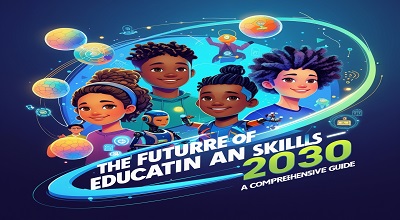Future of Education
Future of Education: The education landscape is rapidly evolving due to technological advancements, globalization, and changing workforce demands. By 2030, education systems worldwide will undergo significant transformations to prepare students for a dynamic future. This article explores the future of education and skills in 2030, highlighting key trends, emerging technologies, essential competencies, and real-world examples.
Key Trends Shaping Education in 2030
1. Shift from Traditional to Lifelong Learning
- Education will no longer be confined to early life but will extend throughout one’s career.
- Micro-credentials, online courses, and upskilling platforms will dominate.
2. Increased Focus on Soft Skills
- Emotional intelligence, creativity, and adaptability will be as crucial as technical skills.
- Employers will prioritize problem-solving and collaboration over rote memorization.
3. Blended and Hybrid Learning Models
- A mix of in-person and digital learning will become standard.
- Virtual reality (VR) and augmented reality (AR) will enhance engagement.
Technological Advancements in Education
1. Artificial Intelligence (AI) in Learning
- AI-powered tutors (e.g., Squirrel AI, Carnegie Learning) provide personalized assistance.
- Automated grading and feedback systems reduce teacher workload.
2. Blockchain for Credentialing
- Secure digital diplomas and certificates (e.g., MIT’s Blockcerts).
- Prevents credential fraud and simplifies verification.
3. Immersive Learning with VR/AR
- Medical students use VR for surgical simulations (e.g., Osso VR).
- History lessons come alive through AR-enhanced textbooks.
Essential Skills for the Future Workforce
1. Digital Literacy
- Coding, data analysis, and cybersecurity basics will be mandatory.
2. Critical Thinking and Creativity
- Automation will replace repetitive tasks, making innovation vital.
3. Cross-Cultural Competency
- Globalization requires understanding diverse perspectives.
Personalized and Adaptive Learning
- Platforms like Khan Academy and Duolingo tailor content to individual progress.
- AI analyzes learning patterns to adjust difficulty levels.
The Role of AI and Automation in Education
- Chatbots assist with administrative tasks (e.g., Georgia State’s “Pounce”).
- Predictive analytics identify at-risk students early.
Global Collaboration and Digital Classrooms
- Schools partner internationally via platforms like Empatico.
- Students work on global projects in real-time.
Sustainability and Green Skills
- Climate education integrates into curricula (e.g., Sweden’s Green Schools).
- Renewable energy and circular economy skills gain importance.
Challenges and Ethical Considerations
- Data privacy concerns with AI-driven education.
- Digital divide may widen inequalities.
Case Studies and Real-World Examples
- Finland’s Phenomenon-Based Learning – Interdisciplinary, student-led projects.
- Singapore’s SkillsFuture Initiative – Government-funded lifelong learning.
- AltSchool (USA) – AI-driven personalized education.
Conclusion
The future of education in 2030 will be dynamic, tech-driven, and skills-focused. Institutions must adapt to prepare students for an unpredictable job market.
FAQs
1. What will education look like in 2030?
Education will be more personalized, tech-integrated, and lifelong, with a strong emphasis on soft skills and digital literacy.
2. Which skills will be most in demand by 2030?
Critical thinking, creativity, emotional intelligence, digital literacy, and sustainability skills.
3. How will AI change education?
AI will enable personalized learning, automate grading, and provide real-time student support.
4. Will traditional schools disappear?
No, but they will evolve into hybrid models combining physical and digital learning.
5. How can educators prepare for 2030?
By embracing technology, continuous professional development, and fostering adaptable learning environments.
Free Download Link: King Shoot APK
